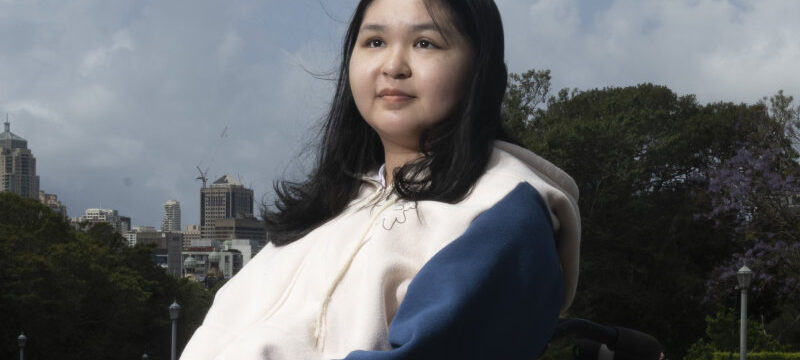Save articles for later
Add articles to your saved list and come back to them any time.
Christie Yu never imagined that, at 22, she would be bound to a wheelchair.
Diagnosed with acute myeloid leukaemia in 2019, chemotherapy ravaged her body. A stem cell transplant from her father followed and helped move her into remission, but that came with its own set of complications.
Fighting cancer has rendered Christie Yu to a wheelchair, with untold financial burdens exacerbated by loss of work.Credit: Louise Kennerley
“The donor cells attacked the host tissues and organs, and that put me in hospital for another three months. And then, due to using high-dose cortisol steroids, I have been left with osteoporosis and bone death to a couple of bones,” Christie explained.
She has had to forgo her pharmacy degree and part-time job, and her mother was forced into early retirement to become Yu’s primary carer. Among other unexpected expenses, the family has had to buy a new car as their old vehicle could not be modified to fit her wheelchair.
“I don’t think anyone would expect any of that when you start the cancer journey, there’s been a lot of grief and no one sat me down and said ‘You are disabled now’, I’ve just had to accept the new normal of survivorship,” she said.
Yu’s story is not uncommon. The untold financial burden of cancer is only increasing, and the nation’s peak cancer bodies say patients and survivors are being left behind.
The Leukaemia Foundation chief executive Chris Tanti said its financial assistant program had received a 37 per cent increase in demand over the past 12 months.
“People can’t afford to put tyres on their cars and that means they can’t get to appointments, it’s extraordinary, people are forced to choose between basics – electricity and food – or getting life-saving treatment,” he said.
Access Economics research estimates that a cancer diagnosis will cost a household about $50,000 per person. However, that can vary according to age, gender and cancer type.
For people aged between 15 and 64, the average lifetime cost of cancer for men is $137,000 and for women, $51,000. That can climb up to $300,000 for men who are diagnosed with brain cancer, according to the data.
The average out-of-pocket costs for blood cancer treatments can range from $5000 to $11,000, according to The Leukaemia Foundation. Its data states that about 42 per cent of patients are forced to take more than three months off work, while 30 per cent have to leave their jobs. The foundation has launched a giving platform in response to the overwhelming demand for financial help.
Koby Adams has spent much of his 10 years of life in hospital. His battle with Zellweger spectrum disorder has meant his family has had to juggle huge financial burden to ensure their son’s treatment.
But the burden of chronic disease is not limited to cancer patients; a new study from the University of Sydney examined the direct and indirect costs of paediatric admissions for children and how that impacts the child, family and society and found that each admission costs families $687.
That figure was found by quantifying the direct costs of hospitalisation, as well as the indirect and hidden costs – emotional, financial and social, time taken off work, incidental costs for meals and travel.
The paper also highlighted poorer educational outcomes for children with increased re-admissions and lengths of stay, and linked them to academic results that fell below national minimum standards on national literacy and numeracy tests.
Koby Adams is 10 years old and was not expected to live past a year. He has spent his life in and out of hospital battling Zellweger spectrum disorder, a rare condition that has affected his ability to sleep safely at night.
To help alleviate the burden on the Adams family, the paediatric sleep unit at John Hunter Hospital developed an at-home sleep system, which Koby’s mother Ashlyn said has drastically improved the quality of her child’s life. She hopes more healthcare providers will consider thinking outside the box for the delivery of care.
“It would be beneficial for all eligible children to be safely monitored from the comfort of their own bed, relieving the stress of a hospital visit, while receiving fast-tracked remote hospital care,” she said.
Nicky Bowie, chief executive of Hospitals United for Sick Kids – which helped fund the University of Sydney study – said she hoped more healthcare providers would look to find workarounds like the one established for Koby, and hoped the research would aid a “better understanding [of] the situation of sick kids and their families to hopefully inform policy and improve our health systems”.
Cancer Council Australia director of cancer control policy Megan Varlow, said financial hardship as a result of a chronic illness could affect anyone at any time and called on the healthcare sector to better support patients and survivors. Cancer Council Australia’s own support line has also experienced an increase in demand, receiving calls from more than 36,000 cancer patients last year.
“This includes improving access to cancer treatments and financial support, whilst also facilitating better conversations between healthcare providers and people affected by cancer about what costs they can expect to help make informed decisions about their care,” she said.
Start the day with a summary of the day’s most important and interesting stories, analysis and insights. Sign up for our Morning Edition newsletter.
Most Viewed in National
From our partners
Source: Read Full Article


